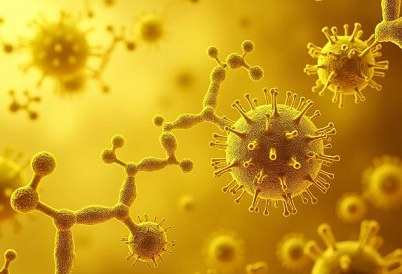Human coronaviruses hijack host transcription factor HSF1 to enhance viral replication
Nikhil Prasad Fact checked by:Thailand Medical News Team Sep 09, 2024 7 months, 2 weeks, 3 days, 14 hours, 57 minutes ago
Medical News: A recent study has shed light on how human coronaviruses (HCoVs), including highly pathogenic strains like SARS-CoV-2, manipulate a key host cellular mechanism to boost their replication. The research conducted by scientists from the University of Rome Tor Vergata-Italy and the MRC Laboratory of Molecular Biology in Cambridge-UK reveals that HCoVs activate and hijack the host transcription factor HSF1 (heat-shock factor 1), enabling the virus to replicate more efficiently. This
Medical News report delves into the study findings, explaining them in simple terms for everyone to understand.
 Human coronaviruses hijack host transcription factor HSF1 to enhance
Human coronaviruses hijack host transcription factor HSF1 to enhance
viral replication
The Role of HSF1 in Cells
In human cells, HSF1 plays a critical role in responding to stress by regulating the production of proteins known as heat-shock proteins (HSPs). These proteins are essential for protecting cells from various types of stress, such as high temperatures or the presence of damaged proteins. HSF1 controls the production of HSPs, helping cells to maintain proper protein balance.
The study highlights the breakthrough discovery that human coronaviruses, including the seasonal HCoVs and the SARS-CoV-2 variants, use this same mechanism for their own benefit. By activating HSF1, the viruses trick the cells into enhancing viral replication, rather than protecting the cell from harm.
How Human Coronaviruses Hijack HSF1
The study found that human coronaviruses trigger the activation of HSF1 during the later stages of infection. In particular, the virus causes the phosphorylation of HSF1, a process that makes it more active. This activation of HSF1 leads to a series of events inside the infected cell, where the production of certain HSPs is increased. Surprisingly, instead of helping the cell fight the viral invasion, the activated HSF1 pathway aids the virus in replicating and producing more viral particles.
The researchers conducted experiments by infecting human lung cells and other cell types with different coronaviruses, including the seasonal HCoV-229E, HCoV-OC43, and the more dangerous SARS-CoV-2 variants like Alpha, Delta, and Omicron. They observed that all these viruses caused significant HSF1 activation, suggesting that this manipulation is a common strategy employed by various types of coronaviruses.
HSF1 Activation Leads to Increased Viral Replication
One of the most important findings of this study is that blocking the activation of HSF1 can significantly reduce viral replication. The research team used small-molecule inhibitors to block the activity of HSF1 in infected cells. The results were striking - when HSF1 was silenced or inhibited, the production of new viral particles dropped significantly. This indicates that HSF1 activation is crucial for the virus to reproduce effectively.
In further experiments, the researchers silenced the HSF1 gene in human lung cells using RNA interference. These cells, when infected with human coronaviruse
s, produced far fewer viral particles than cells with active HSF1. These results suggest that targeting the HSF1 pathway could offer a new strategy for developing antiviral treatments against human coronaviruses, including SARS-CoV-2.
The Unique Role of HSPs in Coronavirus Infections
Interestingly, the study found that not all heat-shock proteins (HSPs) were involved in helping the virus. While some HSPs, like HSP70 and HSPA6, were highly expressed in infected cells, others, like HSP90 and HSP60, remained largely unchanged. The researchers observed that certain HSPs, such as HSP70, helped the virus in its replication process by ensuring proper folding and assembly of viral proteins.
HSP70, a key protein that helps other proteins fold correctly, was found in high quantities in cells infected with HCoV. This is particularly important because viral proteins must be folded correctly for the virus to function and replicate. The virus exploits this cellular machinery to ensure its survival and multiplication within the host. Other HSPs, like HSPA6, were also found to play a significant role in the virus's ability to evade the host’s immune defenses.
Implications for Future Antiviral Therapies
The findings from this study open new possibilities for antiviral strategies targeting human coronaviruses. Since HSF1 activation is so critical for the replication of coronaviruses, developing drugs that can block this activation could be a potential way to treat COVID-19 and other coronavirus-related diseases.
One of the key compounds tested in this study was DTHIB, a small-molecule inhibitor that targets HSF1. When used in infected cells, DTHIB significantly reduced the replication of both seasonal and highly pathogenic coronaviruses, including SARS-CoV-2. This suggests that drugs targeting HSF1 could be a valuable tool in combating future coronavirus outbreaks.
The study also highlights the complexity of viral infections and how viruses can co-opt normal cellular processes for their own benefit. By understanding these mechanisms in greater detail, scientists may be able to develop more effective treatments that prevent viruses from hijacking the host's cellular machinery.
Conclusion
In conclusion, the discovery that human coronaviruses, including SARS-CoV-2, activate and hijack the host transcription factor HSF1 to enhance viral replication is a significant advancement in our understanding of coronavirus biology. This insight opens new avenues for developing antiviral therapies that target the HSF1 pathway. By blocking this critical mechanism, it may be possible to reduce the severity of coronavirus infections and improve patient outcomes.
The study findings were published in the peer-reviewed journal: Cellular and Molecular Life Sciences.
https://www.thailandmedical.news/news/protein-from-bitter-melon-inhibits-sars-cov-2-infection
For the latest COVID-19 News, keep on logging to Thailand
Medical News.
Read Also:
https://www.thailandmedical.news/news/new-antiviral-strategy-targets-heat-shock-protein-70-to-combat-covid-19
https://www.thailandmedical.news/news/breaking-discoveries-cell-surface-protein-hspa5-bip-grp78-unveiled-as-key-player-in-cancers-and-is-also-a-receptor-for-sars-cov-2
